

Modern Trends In Education: 50 Different Approaches To Learning. Modern Trends In Education: 50 Different Approaches To Learning by Lisa Chesser, opencolleges.edu.au Education sprouts in many forms depending on how you look at it.

Our views of what it should look like and how it should materialize depend on our value of it and our experience with it. What if a class consisted of words that led to information that whirled into blended realms of creativity set up just for students, created by students. The students then dictated what they learned instead of reluctantly ingesting information and standards imposed upon them.
That exists here and now. Take a tour of 50 different views of education that somehow find a similar note: Education must change. 1. 20 Options for Real-Time Collaboration Tools. About ETR Community.
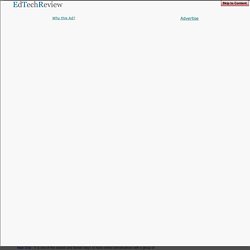
Las 12 tendencias en las tecnologías educativas de los próximos cinco años. How To Use Social Content Curation For Marketing Your Brand: 10 Tips. I’m seeing more Scoopit links in my Twitter stream and I’m not crazy about it.

Sure it’s quick and easy to share with Scoopit. But it not quick and easy to consume. For me it's all about the econ... Marty Note (here is comment I wrote on Dr. V's blog) Appreciate Bryan’s and Joseph’s comment, but I rarely use Scoop.it as a pass through. Rich snippets are “blog” posts that fall between Twitter and the 500 to 1,000 words I would write in Scenttrail Marketing. I was taught NOT to pass through links on Scoop.it early on by the great curator @Robin Good . Bryan is correct that some curators new to Scoop.it haven’t learned the Robin Good lesson yet. For my part I always identify my Scoop.it links, probably about half the content I Tweet and about a quarter of my G+ shares.
When you follow or consistently share content from a great curator on Scooop.it you begin to understand HOW they shape the subjects they curate. Fundación Telefónica - Curalia: Red educativa de selección, curación y compartición de contenidos. Footprints of emergence. Roy Trevor Williams (1), Jenny Mackness (2), and Simone Gumtau (1) (1) University of Portsmouth, United Kingdom, (2) Independent Consultant, United Kingdom Abstract It is ironic that the management of education has become more closed while learning has become more open, particularly over the past 10-20 years.
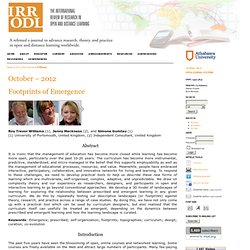
The curriculum has become more instrumental, predictive, standardized, and micro-managed in the belief that this supports employability as well as the management of educational processes, resources, and value. Meanwhile, people have embraced interactive, participatory, collaborative, and innovative networks for living and learning. To respond to these challenges, we need to develop practical tools to help us describe these new forms of learning which are multivariate, self-organised, complex, adaptive, and unpredictable. Keywords: Emergence; prescribed; self-organization; footprints; topographies; curriculum; design; curation; co-evolution Introduction.
BYOD (Bring Your Own Device) Networked Learning. Game-Based Learning. MOOC (Masive Open Online Courses) Othervoices » Blog Archive » The Role of Libraries and Information Professionals in OER Initiatives. Gema Bueno de la Fuente of the University Carlos III of Madrid reports on the outputs of a survey, undertaken with R.
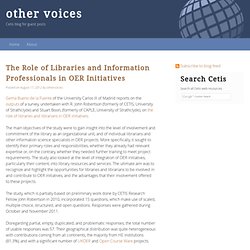
John Robertson (formerly of CETIS, University of Strathclyde) and Stuart Boon, (formerly of CAPLE, University of Strathclyde), on the role of libraries and librarians in OER initiatives. The main objectives of the study were to gain insight into the level of involvement and commitment of the library as an organizational unit, and of individual librarians and other information science specialists in OER projects. More specifically, it sought to identify their primary roles and responsibilities, whether they already had relevant expertise or, on the contrary, whether they needed further training to meet project requirements. E-Learning 2.0: la nueva tendencia de capacitación en las empresas. El interés de las empresas por implementar programas de formación orientados a garantizar resultados de negocio, se evidencia en el crecimiento de una modalidad que está cambiando la forma en que aprendemos, al involucrar herramientas y servicios de la Web 2.0 en los procesos educativos.
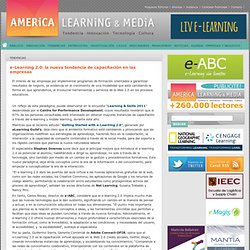
Un reflejo de este paradigma, puede observarse en la encuesta “Learning & Skills 2011” desarrollada por el Centre for Performance Development, cuyos resultados revelaron que el 87% de los personas consultadas está interesado en obtener mayores instancias de capacitación a través del e-learning y mobile learning, durante este año. El especialista Stephen Downes suele decir que la principal mejora que introduce el e-learning 2.0 es potenciar al alumno, habilitándolo a dirigir su aprendizaje, no solo a través de la tecnología, sino también por medio de un cambio en la gestión y procedimientos formativos.
Uno de los temas que mayor interés despierta es la evolución del mobile learning en las empresas. Internet Society - Los líderes de Internet. The success of the Internet is not an accident.
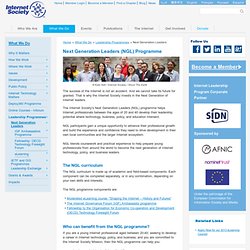
And we cannot take its future for granted. That is why the Internet Society invests in the Next Generation of Internet leaders. The Internet Society’s Next Generation Leaders (NGL) programme helps Internet professionals between the ages of 20 and 40 develop their leadership potential where technology, business, policy, and education intersect. NGL participants gain a unique opportunity to advance their professional growth and build the experience and confidence they need to drive development in their own local communities and the larger Internet ecosystem. NGL blends coursework and practical experience to help prepare young professionals from around the world to become the next generation of Internet technology, policy, and business leaders. The NGL curriculum The NGL curriculum is made up of academic and field-based components. The NGL programme components are: Who can benefit from the NGL programme?
How to apply for the NGL programme.